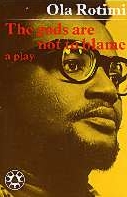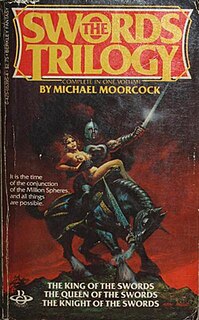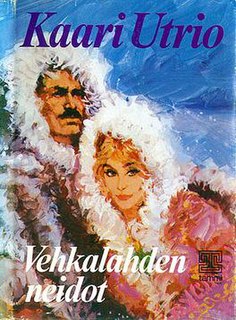 W
WThe Dancers at the End of Time is a series of science fiction novels and short stories written by Michael Moorcock, the setting of which is the End of Time, an era "where entropy is king and the universe has begun collapsing upon itself". The inhabitants of this era are immortal decadents, who create flights of fancy via the use of power rings that draw on energy devised and stored by their ancestors millions of years prior. Time travel is possible, and throughout the series various points in time are visited and revisited. Space travellers are also common, but most residents of the End of Time find leaving the planet distasteful and clichéd. The title of the series is itself taken from a poem by a fictitious 19th-century poet, Ernest Wheldrake, which Mrs. Amelia Underwood quotes in The End of All Songs. "Ernest Wheldrake" had been a pseudonym used by Algernon Charles Swinburne.
 W
WThe Antagonists is a 1971 historical novel by Ernest K. Gann about the siege of the Masada citadel in Israel by the 10th Legion of the Roman Empire in AD 73. The novel was adapted as a television miniseries, Masada, broadcast first in 1981. The two antagonists of the title are Eleazer ben Yair, leader of the Jewish Zealots who make a final stand on Masada; and the Roman general Flavius Silva.
 W
WChronicle in Stone is a novel by Ismail Kadare. First published in Albanian in 1971, and sixteen years later in English translation, it describes life in a small Albanian city during World War II.
 W
WCry of Morning is a novel by the English-born author, Brian Cleeve. It deals with the economic and cultural transformation that overtook Ireland during the 1960s. It marked a significant shift away from the murder mysteries and spy thrillers for which Cleeve had previously been noted.
 W
WThe Dead River is the title of the first novel written by the 20th century Albanian writer Jakov Xoxa. One of the best-known of Jakov Xoxa's, the literary work was written in 1964 only to be published 7 years later.
 W
WThe Decay of the Angel is a novel by Yukio Mishima and is the fourth and last in his Sea of Fertility tetralogy.
 W
WDragonquest is a science fantasy novel by the American-Irish author Anne McCaffrey. It is the sequel to Dragonflight, set seven years later and the second book in the Dragonriders of Pern series. Dragonquest was first published by Ballantine Books in May 1971.
 W
WEqual Danger is a 1971 detective novel by Leonardo Sciascia where a police inspector investigating a string of murders finds himself involved in existential political intrigues. Set in an indeterminate country this novel is informed by the corrupt politics and the Mafia of Sciascia's experiences in 1970s Sicily.
 W
WThe Fox From Up Above and the Fox From Down Below is the sixth and final novel by Peruvian writer José María Arguedas published posthumously in 1971. It is an unfinished novel, interspersed with some personal and intimate diaries where the author relates the torments overwhelming him while writing the novel, finally announcing his impending suicide. Complementing the work are two letters and an epilogue. The novel depicts the consequences of accelerated modernization of the port of Chimbote, motivated by the fishing boom; thousands of Andean immigrants arrive, attracted by the opportunity to earn a living in a thriving industrial city, while at the same time they assimilate themselves under the guise of 'modernity', all of which, from the point of the writer, brings dire consequences: loss of Andean cultural identity and its moral degeneracy, succumbing to the vices of the city in bars and brothels.
 W
WThe Futurological Congress is a 1971 black humour science fiction novel by Polish author Stanisław Lem. It details the exploits of the hero of a number of his books, Ijon Tichy, as he visits the Eighth World Futurological Congress at a Hilton Hotel in Costa Rica. The book is Lem's take on the common science fictional trope of an apparently Utopian future that turns out to be an illusion.
 W
WGangtokey Gondogol is a short novel by Satyajit Ray featuring the private detective Feluda. This story was first published in the Desh magazine in 1970 and then published in book form in 1971 by Ananda Publishers.
 W
WThe Gods Are Not To Blame is a 1968 play and a 1971 novel by Ola Rotimi. An adaptation of the Greek classic Oedipus Rex, the story centres on Odewale, who is lured into a false sense of security, only to somehow get caught up in a somewhat consanguineous trail of events by the gods of the land.
In a Free State is a novel by V.S. Naipaul published in 1971. It won that year's Booker Prize. The plot consists of a framing narrative and three short stories - “One out of Many,” “Tell Me Who to Kill,” and the title story, “In a Free State.” The work is symphonic, with different movements converging towards a common theme; although the theme is not spelled out, it evidently concerns the price of freedom, with analogies implicitly drawn between the three scenarios.
 W
WInterlok is a 1971 Malay language novel written by Malaysian national laureate Abdullah Hussain. The novel was included in the syllabus for the Malay Literature subject as compulsory reading for students in Form 5 in schools throughout Malaysia. Interlok caused a controversy when detractors claim that the novel contained derogatory words to describe Malaysian Indians, such as "pariah" and "black people". The largest Malaysian Indian political party, the Malaysian Indian Congress (MIC), demanded that the novel be removed from the school syllabus.
 W
WKersantin poika is a 1971 novel by Finnish author Veijo Meri. It won the Nordic Council's Literature Prize in 1973.
 W
WLion Country is a novel by Frederick Buechner, and the first in the Book of Bebb series. Lion Country was written in 1971, and was a finalist for the National Book Award for Fiction in 1972.
 W
WMalina is a 1971 novel by the Austrian writer Ingeborg Bachmann. It tells the story of a female writer and her relationships with two different men, one joyous and one introverted. The book was adapted into a 1991 film with the same title, directed by Werner Schroeter from a screenplay by Elfriede Jelinek.
 W
WA Perfect Vacuum is a 1971 book by Polish author Stanisław Lem, the largest and best known collection of Stanislaw Lem's fictitious criticism of nonexisting books. It was translated into English by Michael Kandel. Some of the reviews remind the reader of drafts of his science fiction novels, some read like philosophical pieces across scientific topics, from cosmology to the pervasiveness of computers, finally others satirize and parody everything from the nouveau roman to pornography, Ulysses, authorless writing, and Dostoevsky.
 W
WReunion is a novella by Fred Uhlman, set in Germany, seven years before the start of World War II. The novella was first published in 1971 in an edition of 700, plus 50 hors commerce signed and numbered by the author.
 W
WShira is a 1971 posthumously-published unfinished Hebrew-language novel by Shmuel Yosef Agnon first serialized in Haaretz between 1948 and 1966, his longest novel at 558 pages and the last one he wrote. It was published by Schocken Books and edited by Emuna Agnon Yaron who also wrote the afterword and is widely considered one of the greatest Israeli novels.
 W
WA Small Place in Italy is a travel memoir and autobiographical novel written by Eric Newby, author of The Last Grain Race, A Short Walk in the Hindu Kush and Slowly Down the Ganges. In 1967, Eric Newby and his wife Wanda acquire an old run-down farmhouse in Italy, I Castagni, in the foothills of the Apuan Alps on the borders of Liguria and northern Tuscany. The book is a personal memoir of the couple's experiences in renovating the house, which had a tileless roof, a long-abandoned septic tank and a wealth of indigenous flora and fauna, as well as a vivid description of their neighbours and the lifestyle of country people in Italy at that time.
 W
WSonar Kella, also Shonar Kella is a 1971 mystery novel by Bengali writer and filmmaker Satyajit Ray. In 1974, Ray directed a film adaption of the book, also named Sonar Kella, starring Soumitra Chatterjee, Santosh Dutta, Siddartha Chatterjee and Kushal Chakraborty. The movie was released in the United States as The Golden Fortress.
 W
WThe Swords Trilogy is a series of fantasy novels by Michael Moorcock about Corum Jhaelen Irsei, an aspect of the Eternal Champion. It consists of three books published in 1971: The Knight of the Swords, The Queen of the Swords, and The King of the Swords. In the UK the trilogy has been published under the titles The Swords of Corum, Corum, and most recently Corum: The Prince in the Scarlet Robe. The Swords Trilogy is the original title in the US where it has more recently been published as Corum: The Coming of Chaos. It is followed by a second trilogy about Corum, The Prince with the Silver Hand.
 W
WThis World and the Other is a novel by Nobel Prize-winning author José Saramago. It was first published in 1971.
 W
WVehkalahden neidot is a historical novel by Finnish author Kaari Utrio.